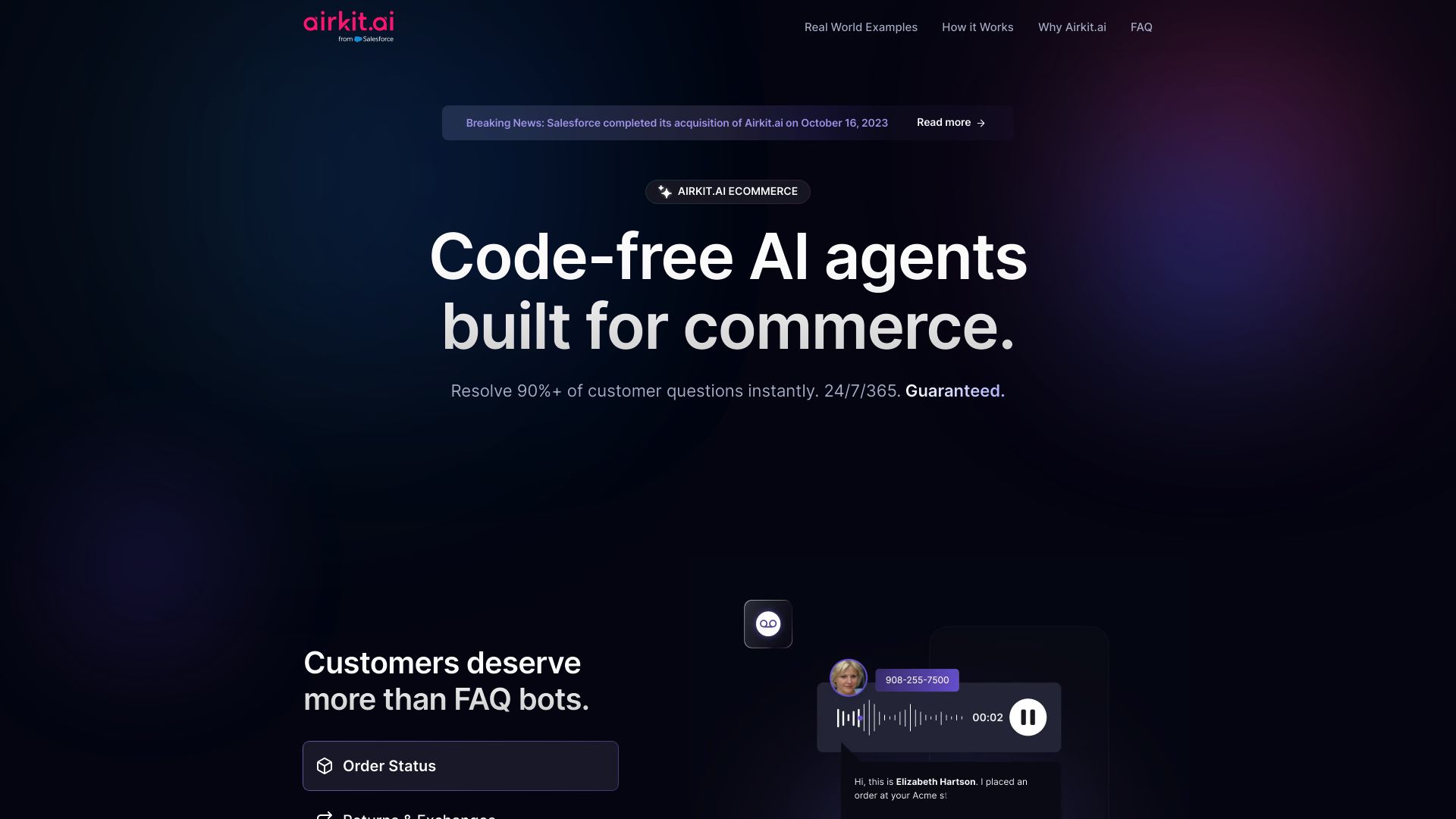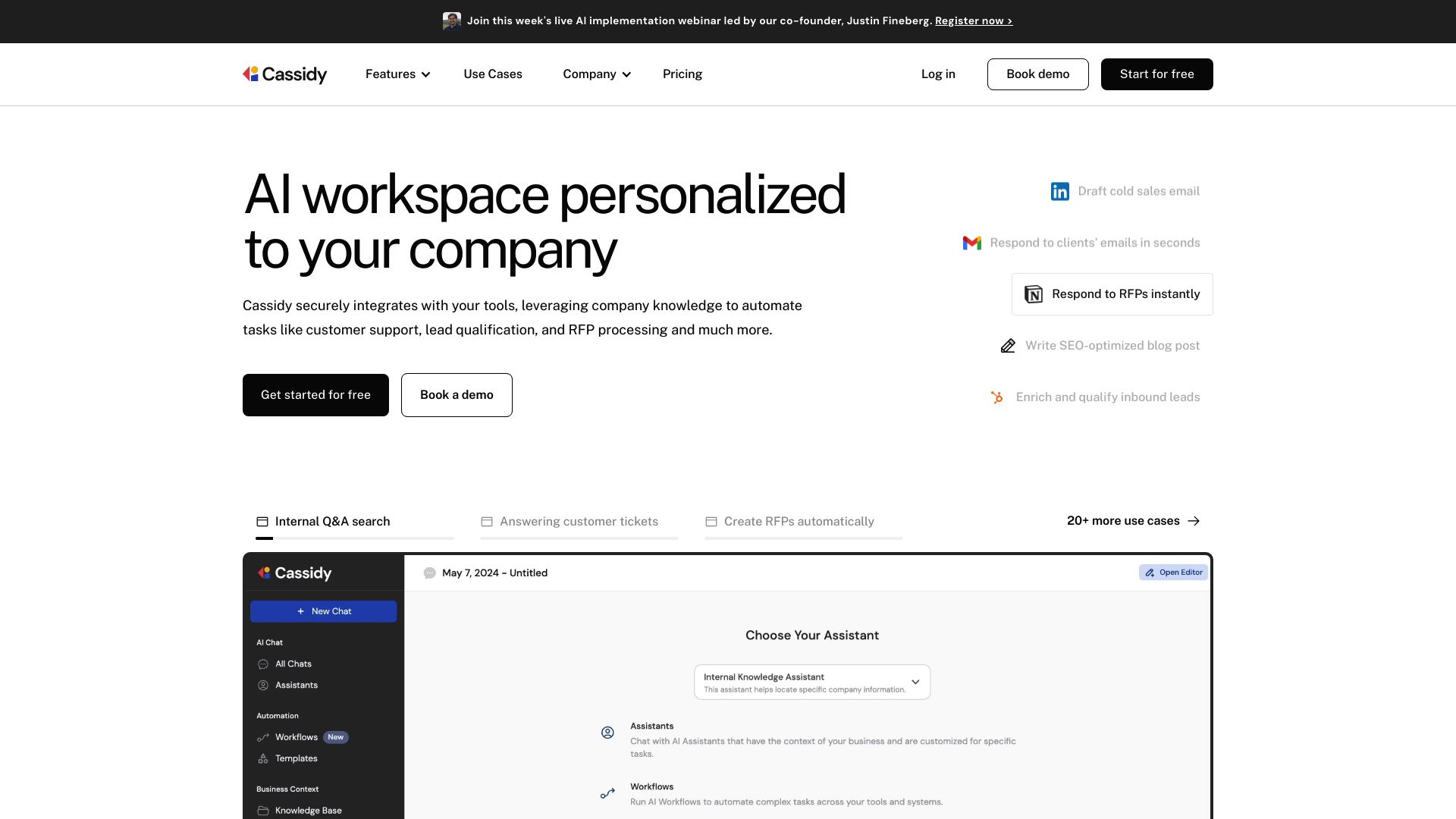Airkit AI vs. Cassidy: Comparing AI Agent Platforms
AI-powered customer service solutions have become pivotal for businesses seeking to enhance efficiency and customer satisfaction. This comparison explores Airkit AI vs. Cassidy, two leading platforms in the AI agent development space, alongside SmythOS, our cutting-edge solution. Airkit AI, recently acquired by Salesforce, offers rapid deployment of no-code AI agents tailored for e-commerce customer service.
Cassidy provides a versatile platform with a user-friendly workflow builder and model-agnostic approach, allowing for customization across various industries. SmythOS emerges as a superior alternative, combining the strengths of both while offering unparalleled flexibility, integration capabilities, and deployment options. This review delves into the unique features, strengths, and limitations of each platform, equipping readers with the knowledge to make informed decisions about AI-driven customer service solutions.
Airkit AI Overview
Airkit AI equips businesses with intelligent, no-code AI agents to revolutionize customer service in the e-commerce sector. Recently acquired by Salesforce, Airkit AI seamlessly integrates with existing CRM and helpdesk systems to automate repetitive support tasks.


Airkit AI’s platform enables rapid deployment of AI agents across multiple channels including web chat, mobile, voice, and email. These agents leverage continuous learning to improve their problem-solving capabilities over time, resolving up to 90% of common customer queries without human intervention. This scalability allows businesses to handle demand spikes efficiently while maintaining personalized support.
Airkit AI’s platform enables rapid deployment of AI agents across multiple channels including web chat, mobile, voice, and email. These agents leverage continuous learning to improve their problem-solving capabilities over time…
Key features include pre-built conversational skills tailored for e-commerce, integration with Salesforce Service Cloud, and a focus on compliance and transparency. Airkit AI emphasizes ease of use, allowing teams to deploy sophisticated AI agents within hours without coding knowledge. The Co-Pilot mode facilitates collaboration between AI and human agents, enhancing overall customer service quality.
While Airkit AI offers powerful automation capabilities, it may have limitations in areas like visual building tools, multi-agent collaboration, and certain deployment options. The platform’s primary focus on e-commerce could potentially limit its applicability in other industries. Additionally, as a Salesforce-owned product, it may prioritize integration with Salesforce ecosystems over other platforms.
Airkit AI positions itself as a transformative solution for e-commerce customer service, promising to reduce agent burnout, improve response times, and enhance overall customer satisfaction. Its no-code approach and industry-specific focus make it particularly attractive for businesses looking to quickly implement AI-driven support solutions within the Salesforce environment.
Cassidy Overview
Cassidy specializes in AI automations and assistants tailored to specific business needs. The platform integrates with existing tools and leverages company knowledge to automate tasks like customer support, lead qualification, and RFP processing. This personalization enhances productivity by equipping AI assistants with full context specific to each business.
Cassidy specializes in AI automations and assistants tailored to specific business needs. The platform integrates with existing tools and leverages company knowledge to automate tasks…


Cassidy’s model-agnostic approach allows users to employ any foundational AI model, future-proofing AI strategies. The platform seamlessly integrates with various data sources, including Google Drive, Slack, and Notion. Enterprise-grade security ensures data confidentiality by never using client data for model training.
A standout feature is Cassidy’s user-friendly workflow builder. The no-code, drag-and-drop interface enables users to construct complex AI automations without extensive programming knowledge. This accessibility democratizes AI development, allowing non-technical teams to harness AI’s power for enhancing productivity and operational efficiency.
A standout feature is Cassidy’s user-friendly workflow builder. The no-code, drag-and-drop interface enables users to construct complex AI automations without extensive programming knowledge.
Cassidy also offers browser extensions, bringing AI capabilities directly into web applications like LinkedIn and email clients. This feature enhances productivity by providing on-the-go AI assistance. However, the platform’s focus on business-specific customization may limit its appeal for users seeking more general-purpose AI tools.
While Cassidy excels in creating tailored AI solutions, it may require more initial setup and customization compared to platforms offering out-of-the-box solutions. This trade-off between customization and immediate deployment should be considered when evaluating Cassidy against other AI agent builders.
Feature Comparison
Airkit AI and Cassidy offer distinct approaches to AI agent development, with notable differences in their core components and security features. Airkit AI excels in rapid deployment of no-code AI agents for e-commerce customer service, integrating seamlessly with Salesforce ecosystems. Its agents operate across multiple channels and leverage continuous learning to improve over time. However, Airkit AI lacks explicit visual building tools and multi-agent collaboration capabilities.
Cassidy, on the other hand, provides a more versatile platform with a user-friendly workflow builder and model-agnostic approach. It offers greater customization options, allowing businesses to tailor AI assistants to specific needs across various industries. Cassidy’s drag-and-drop interface democratizes AI development, making it accessible to non-technical users. Unlike Airkit AI, Cassidy supports integration with multiple data sources and provides browser extensions for on-the-go AI assistance.
In terms of security, both platforms emphasize data protection, but their approaches differ. Airkit AI leverages Salesforce’s robust security infrastructure, while Cassidy implements enterprise-grade security measures to ensure data confidentiality. Cassidy’s commitment to never using client data for model training sets it apart in terms of data privacy. However, neither platform explicitly mentions advanced security features like IP control or OAuth implementation in their core offerings.
Feature Comparison Table
| Airkit AI | Cassidy | SmythOS | |
|---|---|---|---|
| CORE FEATURES | |||
| Visual Builder | ❌ | ✅ | ✅ |
| Autonomous Agents | ✅ | ❌ | ✅ |
| Explainability & Transparency | ❌ | ❌ | ✅ |
| Debug Tools | ❌ | ✅ | ✅ |
| Multimodal | ❌ | ❌ | ✅ |
| Multi-Agent Collaboration | ❌ | ❌ | ✅ |
| Audit Logs for Analytics | ❌ | ❌ | ✅ |
| Work as Team | ❌ | ✅ | ✅ |
| Agent Work Scheduler | ❌ | ✅ | ✅ |
| SECURITY | |||
| IP Control | ❌ | ❌ | ✅ |
| COMPONENTS | |||
| Foundation AIs | ❌ | ✅ | ✅ |
| Huggingface AIs | ❌ | ❌ | ✅ |
| Zapier APIs | ❌ | ✅ | ✅ |
| Classifiers | ❌ | ❌ | ✅ |
| Logic | ❌ | ✅ | ✅ |
| Data Lakes | ❌ | ❌ | ✅ |
| DEPLOYMENT OPTIONS (EMBODIMENTS) | |||
| Deploy as API | ❌ | ✅ | ✅ |
| Deploy as Webhook | ❌ | ✅ | ✅ |
| Staging Domains | ❌ | ❌ | ✅ |
| Production Domains | ✅ | ❌ | ✅ |
| API Authentication (OAuth + Key) | ❌ | ❌ | ✅ |
| Deploy as Site Chat | ✅ | ❌ | ✅ |
| Deploy as Scheduled Agent | ❌ | ✅ | ✅ |
| Deploy as GPT | ❌ | ❌ | ✅ |
| DATA LAKE SUPPORT | |||
| Hosted Vector Database | ❌ | ❌ | ✅ |
| Sitemap Crawler | ❌ | ❌ | ✅ |
| YouTube Transcript Crawler | ❌ | ❌ | ✅ |
| URL Crawler | ❌ | ❌ | ✅ |
| PDF Support | ❌ | ✅ | ✅ |
| Word File Support | ❌ | ✅ | ✅ |
| TXT File Support | ❌ | ✅ | ✅ |
Best Alternative to Airkit AI and Cassidy
SmythOS emerges as the superior alternative to Airkit AI and Cassidy, offering a comprehensive platform for agentic AI automation. We provide unparalleled flexibility and power, empowering users to create sophisticated AI agents without extensive coding knowledge.
Our drag-and-drop interface simplifies complex workflows, allowing rapid development and deployment of AI solutions. Unlike Airkit AI’s narrow focus on e-commerce customer service or Cassidy’s limited model options, SmythOS supports a vast array of AI models from leading providers. This versatility enables users to tackle diverse challenges across industries.
SmythOS excels in its extensive feature set. We offer autonomous agents, multi-agent collaboration, and advanced debugging tools — capabilities absent in both Airkit AI and Cassidy.
SmythOS excels in its extensive feature set. We offer autonomous agents, multi-agent collaboration, and advanced debugging tools — capabilities absent in both Airkit AI and Cassidy. Our platform supports multimodal interactions, enhancing the scope of AI applications beyond text-based systems. Additionally, SmythOS provides robust security features, including data encryption and OAuth authentication, ensuring enterprise-grade protection for sensitive information.
The deployment options in SmythOS surpass those of our competitors. Users can deploy AI agents as APIs, webhooks, scheduled tasks, or integrate them directly into existing systems. This flexibility, combined with our scalable infrastructure, allows businesses to grow their AI capabilities seamlessly. SmythOS also supports a wide range of data formats and sources, including PDF, Word, and various web crawlers, providing a comprehensive solution for data processing and analysis.
By choosing SmythOS, users gain access to a future-proof platform that continually evolves to meet emerging AI challenges. Our commitment to user-friendly design, coupled with powerful features, makes SmythOS the ideal choice for businesses and developers seeking to harness the full potential of AI automation.
Conclusion
Airkit AI and Cassidy offer powerful AI agent solutions, each with unique strengths. Airkit AI excels in rapid deployment of e-commerce-focused customer service agents, integrating seamlessly with Salesforce ecosystems. Cassidy provides a versatile platform with a user-friendly workflow builder and model-agnostic approach, allowing for greater customization across industries.
However, SmythOS emerges as the superior choice, offering unparalleled flexibility and power. Our platform’s drag-and-drop interface democratizes AI development, allowing users to create complex workflows without extensive coding knowledge. With support for over 300,000 integrations, SmythOS enables seamless connection to various data sources, APIs, and AI models, surpassing the integration capabilities of both Airkit AI and Cassidy.
Unlike its competitors, SmythOS offers true versatility in deployment options. Our “Create Once, Deploy Anywhere” approach allows AI agents to be easily integrated into multiple environments, including popular platforms like Google Vertex, Microsoft Copilot, and Amazon Web Services Bedrock. This flexibility, combined with our multi-agent orchestration capabilities, positions SmythOS as the ideal solution for businesses seeking to harness the full potential of AI across their operations.
Experience the future of AI agent development with SmythOS. Explore our diverse range of AI-powered agent templates to jumpstart your projects, or create a free account to start building your own custom AI solutions today. With SmythOS, you’ll unlock unprecedented efficiency and innovation in your AI journey.
Last updated:
Disclaimer: The information presented in this article is for general informational purposes only and is provided as is. While we strive to keep the content up-to-date and accurate, we make no representations or warranties of any kind, express or implied, about the completeness, accuracy, reliability, suitability, or availability of the information contained in this article.
Any reliance you place on such information is strictly at your own risk. We reserve the right to make additions, deletions, or modifications to the contents of this article at any time without prior notice.
In no event will we be liable for any loss or damage including without limitation, indirect or consequential loss or damage, or any loss or damage whatsoever arising from loss of data, profits, or any other loss not specified herein arising out of, or in connection with, the use of this article.
Despite our best efforts, this article may contain oversights, errors, or omissions. If you notice any inaccuracies or have concerns about the content, please report them through our content feedback form. Your input helps us maintain the quality and reliability of our information.
